|
|
|
Sort Order |
|
|
|
Items / Page
|
|
|
|
|
|
|
| Srl | Item |
| 1 |
ID:
116732
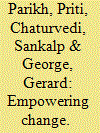

|
|
|
|
|
| Publication |
2012.
|
| Summary/Abstract |
This paper discusses the role of energy provision in influencing the social aspirations of people living in slums. We examine factors that influence the shift in aspirations in five slum settlements using data from 500 interviews conducted in serviced and non-serviced slums from the state of Gujarat in India. The non-serviced slums did not have access to basic services namely water, sanitation, energy, roads, solid waste and rainwater management. We find empirical evidence which suggests that when basic infrastructure provisions are met, slum dwellers shift their focus from lower order aspirations to the higher order aspirations like health, education, housing and land ownership. We argue that energy provision enhances productivity and enables slum dwellers to shift their aspirations upwards. Furthermore, we test the effect of work days lost due to illness on the relationship between higher order aspirations and aspirations for energy provision. When provision of energy is low, higher work day loss dampens higher order aspirations. For policy makers, this study highlights the critical link between the infrastructure services preferred by slum dwellers and their social aspirations for growth.
|
|
|
|
|
|
|
|
|
|
|
|
|
|
|
|
| 2 |
ID:
120936


|
|
|
|
|
| Publication |
2013.
|
| Summary/Abstract |
By now, ensuring Good Urban Governance (GUG) has been one of the major challenges for urban government in the developing countries. Though the main objective of GUG is to ensure equal facilities to urban people, in most cases, it is not materialised. One of the reasons is lack of proper urban planning and management, which by and large, results in unplanned growth of slums and illegal settlement. Due to rapid migration of people from rural to urban areas, urban governments are facing numerous challenges to meet the basic needs of urban people. The rapid inflow of additional people creates extra pressure on water, housing, electricity, gas and other means of survival. This has also instigated various social, political, institutional, economic and structural forms of violence in the cities. At present, urban governments of many developing countries have failed to tackle various forms of crimes and delinquencies. This raises the important query as to how GUG is interlinked with urban security issues? It is in this context that the major objectives of the paper are to perceive the overall phenomenon and outline the various dimensions of urban insecurity issues in relations with the GUG. Based on the evidences of violent activities in different cities, some key challenges of urban government have been discussed. Deriving the causes and consequences of urban violence, some recommendations have been put forward from developing country context.
|
|
|
|
|
|
|
|
|
|
|
|
|
|
|
|
| 3 |
ID:
083824
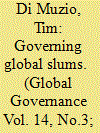

|
|
|
|
|
| Publication |
2008.
|
| Summary/Abstract |
Recent literature has focused on the ways in which civil society organizations are contributing to practices of global governance in an era of neoliberalism. As UN Habitat has pointed out, what has also coincided with the shift to neoliberalism is the proliferation and growth of global slums. As slums have become an increasingly widespread form of human settlement, a global campaign to improve the life of slum dwellers has emerged under the Millennium Development Goals. In this article, I argue that this project can be conceived of as a biopolitical campaign where nongovernmental and community-based organizations are viewed as a kind of panacea for the problem of slums. This view is misguided given the scale of the problem and the apartheid of life chances that has accompanied neoliberalism.
|
|
|
|
|
|
|
|
|
|
|
|
|
|
|
|
| 4 |
ID:
115840
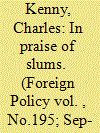

|
|
|
| 5 |
ID:
140013
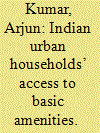

|
|
|
|
|
| Summary/Abstract |
The need for access to basic amenities—drinking water, sanitation, electricity and drainage—to ensure a decent quality of life has been internationally and nationally recognised and acted upon in the form of Millennium Development Goals (MDGs) and various policies and programmes in India. Deprivation and disparities in access to basic amenities in urban India have been highlighted in this article, using data from Census 2001 and 2011 and National Sample Survey’s (NSS) Housing Conditions Rounds unit records data 1993 and 2008–09. Determinants of households having access to basic amenities in the house have been estimated using an econometric exercise on household-level information (NSS, 2008–09). Despite improvement over time, many households in urban India still face deprivations of basic amenities and, hence, low standard of living. Households located in slums and small and medium towns/cities and those belonging to Poor, Scheduled Tribe, Scheduled Caste and Wage Labourers (Casual Labourers) groups were highly deprived of access to basic amenities, and disparities among various socioeconomic groups were observed to be increasing. Findings suggest the need for urgent attention for providing basic amenities, focused on slums, small and medium towns/cities and supplemented with inclusive, group-specific measures in order to raise the overall quality of life and well-being.
|
|
|
|
|
|
|
|
|
|
|
|
|
|
|
|
| 6 |
ID:
172542
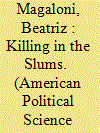

|
|
|
|
|
| Summary/Abstract |
State interventions against organized criminal groups (OCGs) sometimes work to improve security, but often exacerbate violence. To understand why, this article offers a theory about criminal governance in five types of criminal regimes—Insurgent, Bandit, Symbiotic, Predatory, and Split. These differ according to whether criminal groups confront or collude with state actors, abuse or cooperate with the community, and hold a monopoly or contest territory with rival OCGs. Police interventions in these criminal regimes pose different challenges and are associated with markedly different local security outcomes. We provide evidence of this theory by using a multimethod research design combining quasi-experimental statistical analyses, automated text analysis, extensive qualitative research, and a large-N survey in the context of Rio de Janeiro’s “Pacifying Police Units” (UPPs), which sought to reclaim control of the favelas from criminal organizations.
|
|
|
|
|
|
|
|
|
|
|
|
|
|
|
|
| 7 |
ID:
140126
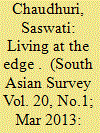

|
|
|
|
|
| Summary/Abstract |
The issue of poverty eradication, or poverty reduction, has been at the core of development economics over the years. There had been concerted efforts to reduce rural poverty, while urban poverty was given less priority by policy-makers. However, urban areas are not free of the maladies of poverty. Urbanisation of poverty has emerged as a new phenomenon. This article attempts to use the sustainable livelihood framework to analyse changes in the livelihood strategies of the poor in the city of Kolkata. The main objective of the article is to present primary data obtained in field study as well as critical analyses on social and economic situation of urban poor in Kolkata. Due to limitations in its scope, the article does not discuss slum policy and management aspects. This article focuses on urban poverty literature based on sociological, economic and policy dimensions and explores current thinking on these issues of urban poverty.
|
|
|
|
|
|
|
|
|
|
|
|
|
|
|
|
| 8 |
ID:
173636


|
|
|
|
|
| Summary/Abstract |
Day-to-day policing represents a fundamental interface between citizens and states. Yet even in the most capable states, local policing varies enormously from one community to the next. The authors seek to understand this variation and in doing so make three contributions: First, they conceptualize communities and individuals as networks more or less capable of demanding high-quality policing. Second, they present original survey data and semistructured interviews on local policing from over one hundred sixty slums, eight thousand households, and one hundred seventy informal neighborhood leaders in India that contribute to the nascent empirical work on comparative policing and order. Third, they find evidence that well-connected individuals and densely connected neighborhoods express greater confidence in and satisfaction with local policing. Critically, these differences do not appear to be a function of a lower propensity for local conflict but rather of an increased capacity to leverage neighborhood leaders to mediate relations with the police. The combination of analytics and empirics in this article provides insight into the conditions under which individuals and communities experience the police as expropriators of rents or neutral providers of order.
|
|
|
|
|
|
|
|
|
|
|
|
|
|
|
|
| 9 |
ID:
141772
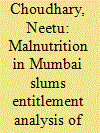

|
|
|
|
|
| Summary/Abstract |
Despite strong constitutional safeguards and promises, malnutrition persists in major Indian conurbations such as Mumbai and manifests as a group phenomenon concentrated in certain slum pockets that remain institutionally isolated. Based on a detailed study of four slums in Mumbai, this article uses the entitlement approach developed by Amartya Sen to examine how group identity affects group differentials in achievement of basic capabilities. Irrespective of similar initial endowments, some groups were found able to achieve upward mobility over time, whereas others remained constantly vulnerable. This may be because the access to various resources and the ability to translate them into functioning assets are mediated in various ways, depending on people’s multiple identities, which sometimes constitute barriers. The article concludes that to alleviate malnutrition, proactive state agency and public transfers are needed to enhance deprived groups’ prospects to build on their basic capabilities to improve their lives.
|
|
|
|
|
|
|
|
|
|
|
|
|
|
|
|
| 10 |
ID:
081714


|
|
|
|
|
| Publication |
2008.
|
| Summary/Abstract |
This article, written in response to recent arguments about whether or not shack dwellers can exercise historical agency, outlines the history of shack dwellers' struggles in the South African city of Durban. The sections looking at struggles under colonialism and apartheid and the nature of the post-apartheid deal with regard to housing draw on the extensive literature on these questions. The final section, which gives an outline of the emergence, nature and experience of the shack dwellers' movement, Abahlali baseMjondolo, is written from a first-hand engagement. The article concludes that in contemporary Durban organized shack dwellers are constituting a major challenge to technocratic conceptions of democracy
|
|
|
|
|
|
|
|
|
|
|
|
|
|
|
|
| 11 |
ID:
169830


|
|
|
|
|
| Summary/Abstract |
“Comparing China, India, and Brazil reveals that current housing policies in all three countries have produced new forms of exclusion for inhabitants of informal settlements.”
|
|
|
|
|
|
|
|
|
|
|
|
|
|
|
|
| 12 |
ID:
105908


|
|
|
|
|
| Publication |
2011.
|
| Summary/Abstract |
This paper explores the emergence of violent child identity politics in a communally sensitive urban slum in Hyderabad, a city in southern India. My ethnographic landscape is Sultanpur, a Muslim-dominated ghetto in the northern quarters of Hyderabad, which has been marked by decades of hostilities between local Hindus and Muslims. These tensions had everyday and extreme manifestations (ranging from quotidian expressions of symbolic violence to rioting, looting and bomb blasts) which increased the vulnerabilities of Muslim male children in the slums; the latter being humiliated by ordinary passers-by in times of peace, and at other times being attacked by rioting mobs. To counter their victimhood and organise their own retribution, sections of local boys in Sultanpur, aged between 9 and 14 years, co-ordinated themselves into child squads (bacchon ke fauj). These child vigilantes patrolled the slum borders and common public places, constantly establishing a disciplinary control over fragile aspects of ghetto life. For example, the male child squads not only aggressively prevented members of other communities from entering the slum, they also monitored the movement of Sultanpur-wallahs, often physically assaulting local women who were caught having affairs with Hindu men. In my paper I show how the power, presence and practices of these child squads upturned traditional structures of male and female authority, contested conventional notions of male childhood in a volatile urban space, and sustained nascent masculinities within the moral and social economy of impoverished Muslim male children.
|
|
|
|
|
|
|
|
|
|
|
|
|
|
|
|
| 13 |
ID:
030527


|
|
|
|
|
| Publication |
London, Michael Joseph, 1968.
|
| Description |
xvi, 233p.hbk
|
|
|
|
|
|
|
|
|
|
|
|
Copies: C:1/I:0,R:0,Q:0
Circulation
| Accession# | Call# | Current Location | Status | Policy | Location |
| 000816 | 973/KEN 000816 | Main | On Shelf | General | |
|
|
|
|
|
|
|
|
|